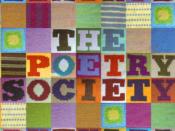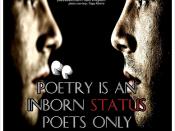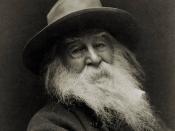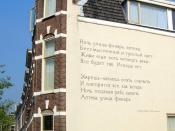Through the poem ï¼ÂWhen I Heard the Learnã»d Astronomerï¼Â, Whitman leaves a dominant impression of his own view of astronomy and itã»s abundance. He describes how the speaker recounts a day sitting through an astronomy lecture, listening to the astronomerã»s dull mathematical descriptions of the stars by charts and figures. Gradually the speaker gets sick of its content. Instead, the speaker finds understanding and satisfaction just by wandering off plainly looking up at the night sky.
The speaker generates different moods in the course of the poem by a shift of tone of voice. Although the poem is written in one single stanza, we can clearly see that there is a division between the first half compared to the second half of the poem. There are specific word choice sequences that support the voice shift. The ï¼Âproofsï¼Â, ï¼Âfiguresï¼Â, ï¼Âcolumnsï¼Â, ï¼Âchartsï¼Â, ï¼Âdiagramsï¼ are all words that imply the dry, stale connotation of the lecturer.
The lecturer, by ï¼Â[dividing], and [measuring]ï¼ things, turns the speaker ï¼Âtired and sickï¼Â. After this, word choice sequence changes to make the rest of the poem into a dreamier tone. Whitman describes how the speaker ï¼Â[glides] outï¼ and ï¼Â[wanders]ï¼ off by himself in the ï¼Âmysticalï¼ night to silently gaze up at the stars. With words that offer different connotations, Whitman achieves the immediate effect of how scientific deciphering of nature cannot compare to self- experience and observation.
The form of the poem also helps to enhance this comparison. Although the poem is written in free verse, the words in the first half appear to look like a chart with words uniformly distributed. ï¼ÂWhenï¼ is repeated four times at the start of each line to give readers a sense of how science is repetitious and boring. However, approaching the last half of the poem, there is a sudden change from a staccato rhythm of words into a smoother one in order to make the tone more free and relaxing. Alliteration of the hissingï¼Âsã»s is included in the last half to generate the feel of night environment: When situated in the ï¼Âmystical moist night-airï¼Â, the speaker then can look up in ï¼Âsilenceï¼ at the ï¼Âstarsï¼Â. It is only when the speaker listens to the monotonous lecture does he realize how that approach towards astronomy proves to be ineffective for him. He can only achieve ï¼Âperfectï¼ understanding of astronomy by ï¼Ârising and gliding outï¼ instead of ï¼Âsittingï¼ inside the lecture hall.
Thus, in this short poem, Whitman explores the tension between the scientific worldview and that of the poet. The poet views the world without the lens of science as opposed to the systematic means of understanding. By juxtaposing complementary words relating to nature to separate the poem, he makes clear of how the scientific approach towards nature is very dull and dry. Only when the narrator leaves the lecture hall does astronomy mean something, when, alone, he looks up in awe at the night sky





